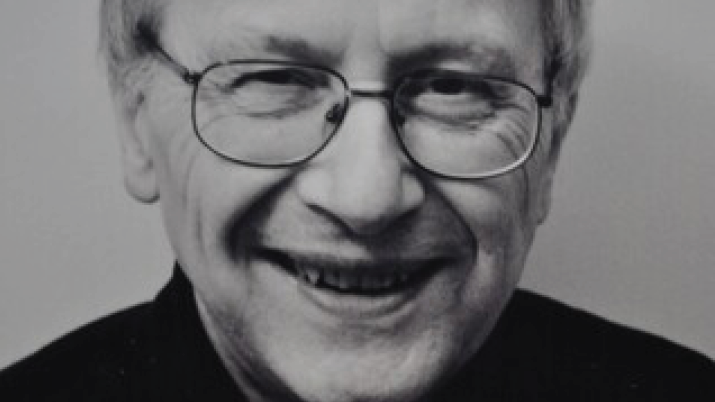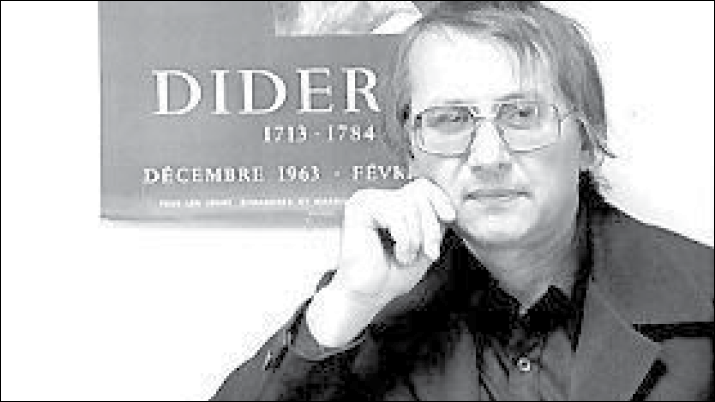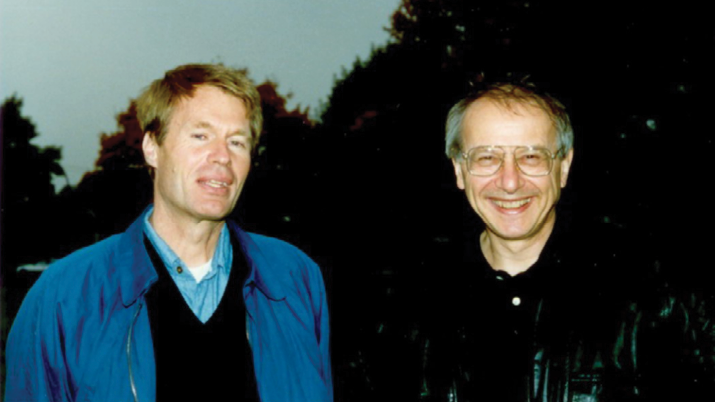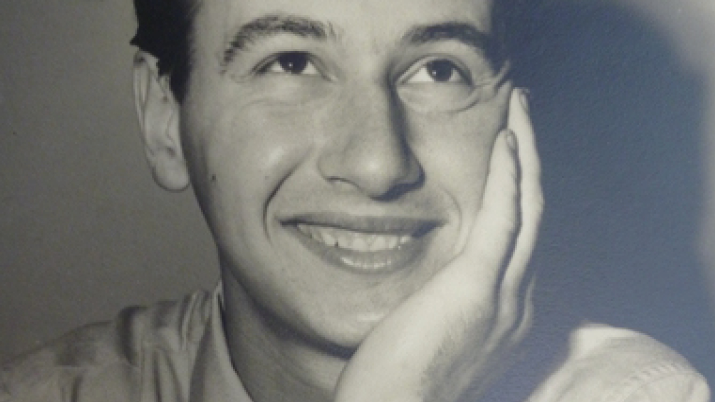

Dr. Laurence Bongie, Professor Emeritus of French at UBC
“The Department, the Faculty, and the University owe Larry a great deal. He helped put us on the academic map in North America.”
Professor Emeritus Laurence (“Larry”) Bongie passed away on December 26th, 2020, but his legacy on French Studies at UBC and the larger realm of 18th century French literature continues on. During his time at UBC from 1953 to 1992, where he served as Department Head for 26 years, he supported the growth of many faculty members who have been integral to the FHIS Department today.
In this article, four of his colleagues—Professor Emeritus André Lamontagne, UBC; Professor Benoît Melançon, Université de Montréal; Professor Emeritus Ralph Sarkonak, UBC; and Assistant Professor Emeritus Bill Winder, UBC—reflect on the key characteristics that made Larry a man who will surely be missed.
Scrupulous Respect for the Facts
“Larry has been known to say, 'I call them as I see them,' and in this case, one can be confident that he has seen the evidence.”
“The defining characteristic of Larry Bongie’s scholarship was a scrupulous respect for the facts: his conclusions were grounded on thoroughgoing research in archives and libraries. Larry has been known to say, ‘I call them as I see them,’ and in this case, one can be confident that he has seen the evidence. He is no captive to ‘idées reçues,’ as his reading of the dispute between David Hume and Jean-Jacques Rousseau, and his biography of Sade (which Robert Darnton has called a ‘negative biography’) amply testify.”
These were the closing remarks of Dr. Benoît Melançon when describing the work of Dr. Larry Bongie at a conference in 2003. At the time, Dr. Melançon was the President of the Canadian Society for Eighteenth-Century Studies (CSECS) where he had met Larry, who was the first scholar to receive the title of Honorary Member of the Society.
“Larry had a Socratic attitude and visceral understanding of how our self-aggrandizement is the surest sign we are missing something important,” says Dr. Bill Winder. “He would question overly confident native speakers by asking how to conjugate traire in the subjunctive. No one knew. His point was that language acquisition is always a work in progress, even for native speakers. In his intellectual pursuits, too, he kept a wary eye on the how the highest aspirations are not free of the lowest acts. In that, Larry could be characterized as a humanist—not just intellectually, but in his day-to-day interactions with friends and colleagues.”
There was no doubt that Larry was an influential and well-respected scholar in French Studies. Dr. André Lamontagne recalls, “When I told my professors at Université Laval that I was shortlisted for a position at UBC, I quickly discovered that Larry was an important figure in Canadian academia.” According to Dr. Ralph Sarkonak, Larry was largely to thank for putting UBC French Studies on the academic map in North America.
Fisherman of the Archives


Dr. Laurence Bongie (1978). Photograph by Jim Banham.
“Rumour has it that when he was in the Bibliothèque Nationale or the Archives Nationales in Paris, other scholars would attempt to follow him around, trying to figure out what he was researching.”
Apparently Larry’s penchant for perusing the archives and emerging with surprising discoveries was a distinguishing characteristic of his.
“Larry was a fisherman,” explains Dr. Sarkonak. “He would go on ‘fishing expeditions’ in the archives des notaires, among other places. This meant reading many boring pages of centuries-old prose (imagine the handwriting, the spelling, the jargon, and the dust!) just in case something interesting turned up. If there was an anecdote to be found, Larry found it.”
“He made many surprising discoveries, including a haughty letter from Marquis de Sade’s mother, Mme Sade, to the police chief demanding that her gay cook be liberated after he was arrested on charges of sodomy. That was how Larry chose to begin his book on Sade: to show how entitled an old aristocratic family felt in dealing with the law, above which they believed they should be allowed free reign. The sense of Sadean entitlement that Larry found in the mother’s letter was analysed and deconstructed in hair-raising detail in her son’s life and writings.”
“Rumour has it that when Larry was in the Bibliothèque Nationale or the Archives Nationales in Paris, other scholars would attempt to follow him around, trying to figure out what he was researching,” says Dr. Sarkonak. “I cannot vouchsafe the story, but it is a good one. He once found a letter from George Washington at the Bibliothèque Mazarine and foolishly told the librarian, who had leaked it to another French academic who later published it. Larry got his revenge though, since books of his were reissued in French, an honor not given to many Anglophone scholars in Western Canada.”
Last Lifetime Department Head


Nobel Prize winner Jean-Marie Gustave Le Clézio with Dr. Laurence Bongie.
“Over his 26-year tenure as Department Head, Larry Bongie built a strong and autonomous French Department.”
“Larry was one of the last lifetime Department Heads in Canada, perhaps because his temperament was so well suited to the task,” says Dr. Winder. “French was the underdog language in Canada, particularly in the West. Larry was always the champion of the underdogs, and sometimes that led to dogfights—which he generally won.”
“Over his 26-year tenure as Department Head, Larry built a strong and autonomous French Department,” says Dr. Lamontagne. “He believed in official bilingualism in Canada and was good at promoting it. He created a federal-funded translation program, realized the potential of French to fulfill the language requirement of the Faculty of Arts, and established guest lectures and exchange programs. We even had future Nobel Prize winner Le Clézio as Writer in Residence! Larry oversaw the hiring of many research-oriented faculty from different horizons, and facilitated curriculum and administrative changes before taking an early retirement in 1992.”
“Larry oversaw the division of the Department of Romance Studies into two scions, the Department of French and the Department of Hispanic and Italian Studies,” says Dr. Winder. Soon after Larry’s retirement, the two departments fused again into what is now the Department of French, Hispanic and Italian Studies. His department had come full circle.”
Paternal Side


Dr. Laurence Bongie in his youth.
“As a junior faculty member, I always felt supported by him.”
“My most special memory of Larry Bongie would be on the day of my job interview and research talk at UBC. He took the time to have an early morning (and calming) cup of coffee with me at the Faculty Club where I was lodging, and then walked me to Buchanan Tower. This was the paternal side of Larry,” says Dr. Lamontagne.
“As a junior faculty member, I always felt supported by him. To me, he was leading by example in maintaining a high research profile, while managing the department. When I became Department Head in 2004, he came to the office to congratulate me and would always drop by once or twice a year to see how I was doing.”
Dr. Sarkonak adds, “Larry had a strong sense of right and wrong. When a colleague of ours was denied tenure, unjustly so, Larry fought tooth and nail to right the injustice. It took a long time, but he did not give in to the Dean. In the end, a lot of us celebrated in a French restaurant in the West End, where bottles of champagne were duly decapitated with a sword!”
A Stimulating Conversationalist
“Truth be told, one of the reasons I always accepted UBC’s invitations to give a talk was to have the opportunity to reconnect with Larry.”
Last but not least, Larry hardly skipped a chance to have stimulating conversations with colleagues from BC and out-of-town.
“Larry displayed his warm personality and fine sense of humor over dinner in French restaurants downtown,” says Dr. Lamontagne. “He was a great storyteller with funny anecdotes about UBC or 18th century life in Paris (police reports about libertine priests, and so on).”
“Larry liked to attend conferences and chat with colleagues and younger scholars (at the time, I was one of them) quite often at the hotel bar,” says Dr. Melançon. “I fondly remember the conferences I was invited to give at UBC in 2000, 2009 and 2015. Whatever the topic—Diderot’s letters, Maurice Richard, the rise of e-books, Sade’s status in Québec—Larry was always in attendance with comments to make and questions to ask.”
“We would sometimes meet at his house or elsewhere in town just for the pleasure of conversation. Truth be told, one of the reasons I always accepted UBC’s invitations was to have the opportunity to reconnect with Larry. E-mail is handy—and Larry was really great at e-mail—but it never is the same as meeting an old friend face to face.”
Farewell
“For the boy who started off driving the family tractor in Saskatchewan, you did well, Larry.”
“Larry ended a brilliant career as a member of the Royal Society of Canada and a recipient of the Palmes Académiques,” says Dr. Sarkonak. “For the boy who began driving on the family tractor in Saskatchewan, you did well, Larry. No need to utter pious platitudes: Larry Bongie was as much a matérialiste as Denis Diderot. He is no more; but we remember l’homme et l’oeuvre.”
“We were not from the same generation, and I’m not sure that we shared common views on all aspects of literary studies, but over the course of 25 years Larry and I had become very good friends,” says Dr. Melançon. “I already miss him.”


